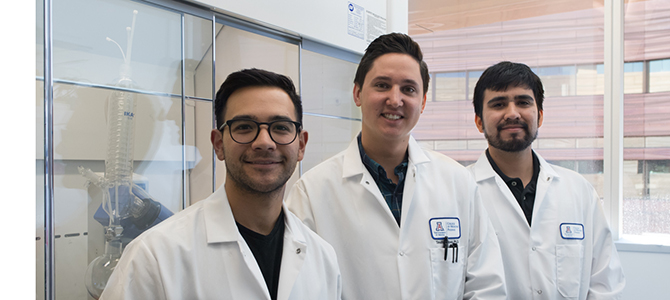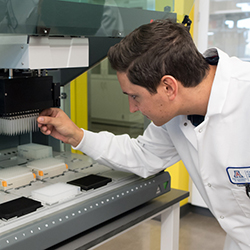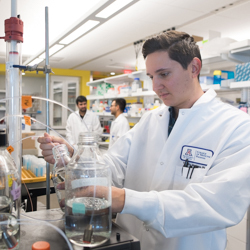
Researcher Seeks to Improve Treatment Options for Cancer

At just 28 years old, Tim Marlowe, PhD, has had a short but accomplished career. As director of drug discovery in the research laboratory of surgical oncologist William Cance, MD, his goal is to develop drugs that target focal adhesion kinase, also known as FAK, a critically important protein for cancer survival and progression.
And while his professional path has been brief, he knows that the road to drug discovery is long and complicated, with lots of twists and turns.

He is driven to find new cancer treatments, he said, because everyone has a story about how cancer has touched a family member or friend.
“It’s one of those terrible obstacles in the world that we need to fix because countless people from every family are losing their lives to cancer,” Dr. Marlowe said.
Dr. Marlowe studied pharmacology as an undergraduate at the University at Buffalo. His introduction to drug discovery occurred during an internship at the University of North Carolina at Chapel Hill, where he studied computational drug discovery and learned to create drug screening assays.
“I was always interested in how pharmaceutical compounds — those small, tiny pills that people take orally — can have such a drastic effect on a patient’s life and disease treatment. It was just fascinating to me,” Dr. Marlowe said.
He finished his PhD at the age of 26 with a joint degree from the University at Buffalo and Roswell Park Cancer Institute.
“People always ask me ‘You’re so young; how did you get here?’ ” Dr. Marlowe said. “I tell them that it was a lot of hard work, late hours, working beyond what was required of me and working toward the goal, which is to develop drugs for cancer. I was working to make a difference. It’s also meeting the right people, like Dr. Cance, who really help foster you as a scientist and help jumpstart your career.”
Dr. Marlowe met Dr. Cance at Roswell Park, where the two started a drug discovery lab.
“I first met Tim when he showed up in my office and his opening line was that he wanted to join our lab efforts to find drugs that target focal adhesion kinase,” Dr. Cance said. “He not only had the passion, but also the drive for drug discovery. He proved to be the smartest and most intuitive graduate student I had seen.”
Dr. Marlowe worked as a postdoctoral fellow, specializing in kinase inhibitors at Dr. Cance’s lab until 2016, when Dr. Cance was offered a position at the University of Arizona College of Medicine – Phoenix as deputy director of the UA Cancer Center Phoenix.

One of the lab’s biggest accomplishments at Roswell was identifying a critical resistance pathway to previous drugs that target FAK. This led them to a new area of research where they’ve begun focusing on alternative regions of FAK, an area no one else in the world is targeting.
“Ideally, we need a drug for every target in cancer,” Dr. Marlowe said. “Cancer cells really do utilize every pathway, and they will escape every sort of treatment you throw at them. Our goal is to switch cancer to a stable disease like high blood pressure rather than a deadly disease."
Media Contact:
Teresa Joseph
Phone: 602-827-2657
Topics
About the College
Founded in 2007, the University of Arizona College of Medicine – Phoenix inspires and trains exemplary physicians, scientists and leaders to advance its core missions in education, research, clinical care and service to communities across Arizona. The college’s strength lies in our collaborations and partnerships with clinical affiliates, community organizations and industry sponsors. With our primary affiliate, Banner Health, we are recognized as the premier academic medical center in Phoenix. As an anchor institution of the Phoenix Bioscience Core, the college is home to signature research programs in neurosciences, cardiopulmonary diseases, immunology, informatics and metabolism. These focus areas uniquely position us to drive biomedical research and bolster economic development in the region.
As an urban institution with strong roots in rural and tribal health, the college has graduated more than 1,000 physicians and matriculates 130 students each year. Greater than 60% of matriculating students are from Arizona and many continue training at our GME sponsored residency programs, ultimately pursuing local academic and community-based opportunities. While our traditional four-year program continues to thrive, we will launch our recently approved accelerated three-year medical student curriculum with exclusive focus on primary care. This program is designed to further enhance workforce retention needs across Arizona.
The college has embarked on our strategic plan for 2025 to 2030. Learn more.